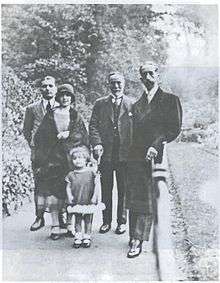Anbara Salam Khalidi
| Anbara Salam Khalidi | |
|---|---|
| Born |
August 4, 1897 Beirut |
| Died |
1986 (aged 88–89) Beirut |
| Occupation | Translator |
| Language | Arabic |
| Citizenship | Lebanese |
| Alma mater | American University of Beirut |
| Period | Late 1920s – 1980s |
| Genre | Translations of classics |
| Spouse | Ahmad Samih Al Khalidi |
| Relatives |
Salim Ali Salam (father) Saeb Salam (brother) Walid Khalidi (step son) Tarif Khalidi (son) |
Anbara Salam Khalidi (Arabic: عنبرة سلام الخالدي) (4 August 1897–May 1986) was a Lebanese feminist, translator and author, who significantly contributed to the emancipation of Arab women.[1]
Early life and education
Khalidi was born into an eminent Lebanese family in Beirut in 1897.[2][3] She was the daughter of Salim Ali Salam, a deputy in the Ottoman parliament and a merchant, and the sister of former Lebanese prime minister Saeb Salam.[4] Two of her brothers served as cabinet ministers of Lebanon.[5]
She received a modern education and learned French. She and her siblings attended the Anglican Syrian College in Ras Beirut, which is the predecessor of the American University of Beirut.[6] From 1925 to 1927 she studied in the United Kingdom.[6]

Activities
After returning to Beirut, Khalidi joined the women's movement.[6] She was the first Muslim woman in Lebanon to publicly abandon the veil in 1927 during a lecture at the American University of Beirut.[2][7] She was the first to translate Homer's Odyssey and Virgil’s Aeneid into Arabic.[6] [7] Her memoir was published in 1978 with the title of Jawalah fil Dhikrayat Baynah Lubnan Wa Filastin (A Tour of Memories of Lebanon and Palestine in English).[5] It was translated into English in 2013 under the title of Memoirs of an Early Arab Feminist.[2]
In her memoir, Khalidi emphasized the negative effects the activities of Jamal Pasha, Ottoman ruler of Syria, had on her family and her childhood.[8]
Personal life and death
Anbara Salam married a Palestinian educator, Ahmad Samih Al Khalidi (d. 1951) in 1929.[6][9] It was his second marriage.[10] He was the principal of the Arab College in Jerusalem in Mandatory Palestine.[10] They settled in Jerusalem and then in Beirut.[6] She died in Beirut in May 1986.[7][9]
Dedication
Anbara Salam Khalidi was the subject of a Google Doodle on 4 August 2018, the 121st anniversary of her birth.[11]
References
- ↑ Hussain Abdul Hussain (16 April 2013). "Why Lebanon Matters". Now Lebanon. Retrieved 12 June 2013.
- 1 2 3 "Memoirs of An Early Arab Feminist". Amazon. Retrieved 5 April 2013.
- ↑ Ussama Makdisi (22 June 2010). Faith Misplaced: The Broken Promise of U.S.-Arab Relations: 1820-2001. PublicAffairs. p. 149. ISBN 978-1-58648-856-7. Retrieved 12 June 2013.
- ↑ "Saeb Salam". The Guardian. 1 February 2000. Retrieved 5 April 2013.
- 1 2 Sarah Irving (31 May 2013). "Memoir challenges stereotypes of Arab women". Electronic Intifada. Retrieved 12 June 2013.
- 1 2 3 4 5 6 Joseph A. Kechichian (12 March 2009). "Lebanon's lady of mettle". Gulf News. Retrieved 5 April 2013.
- 1 2 3 "Biographical data". Salaam Knowledge. Retrieved 5 April 2013.
- ↑ Fruma Zachs (2012). "Transformations of a Memory of Tyranny in Syria: From Jamal Pasha to 'Id al-Shuhada', 1914–2000". Middle Eastern Studies. 48 (1): 73–88. doi:10.1080/00263206.2012.644459. Retrieved 23 August 2013.
- 1 2 "Anbara Salam al Khalidi". CAMES. Retrieved 12 June 2013.
- 1 2 Philip Mattar (2005). Encyclopedia of the Palestinians. Infobase Publishing. p. 281. ISBN 978-0-8160-6986-6. Retrieved 6 April 2013.
- ↑ "Anbara Salam Khalidi's 121st Birthday". Google. 4 August 2018. Retrieved 16 August 2018.